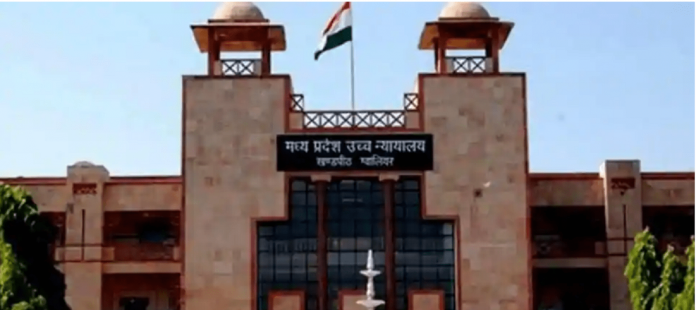The Madhya Pradesh High Court dismissed a petition filed assailing the order passed by the Superintendent of Police Mandla rejecting the claim of the petitioner to get family pension on account of death of her husband.
Rejection order makes mention of the fact that the petitioner’s husband had their first marriage and in his service book the name of the first wife is mentioned. Even in the pension case joint photographs of petitioner’s husband and his first wife have been affixed.
Petitioner’s contention is that her husband had divorced his first wife and had sworn an affidavit before the notary public on 07.10.2014 to the effect that she had taken divorce in 1998-99 as per tribal customs and traditions which has legal sanctity.
She further deposed that they were staying separately for the last 15 years and she has no claim on the body and property of her husband and both are living separately.
It is submitted that the petitioner had contacted marriage in May,2000 and this fact is mentioned in the form which was submitted by her husband in the form.
Thereafter, a notice was issued by the Superintendent of Police Mandla on 23.09.2014 seeking his explanation, but subsequently a departmental enquiry was initiated.
It is submitted that enquiry was not concluded and by implication petitioner’s husband was exonerated in that enquiry. Thus, the petitioner is entitled to get a family pension on account of the death of her husband.
The Counsel for the Petitioner places reliance on the provisions contained in Rule 47 (7)(a)(i) of the M.P. Civil Services Pension Rules, 1976 wherein it is provided that where the family pension is payable to more widows then one, the family pension shall be paid to the widows in equal share. Reading this provision, it is submitted that even if first wife is deemed to be first surviving wife then family pension is to be paid in equal proportion between both the wives.
The Counsel further submits that Hindu laws are not applicable to the tribal community and therefore, no inference can be drawn on the reading or interpretation of Hindu Marriage Act.
It is submitted that petitioner husband’s conduct is against the Madhya Pradesh Civil Services (Conduct) Rules, 1965 and he is not entitled to maintain two wives. It is further submitted that an affidavit sworn in before the notary is not a proof of divorce of the first wife.
After hearing the counsel for the parties and going through the record a Single Bench of Justice Vivek Agrawal noted that Rule 22 of M.P. Civil Services (Conduct) Rules, 1965 deals with bigamous marriages.
Sub rule 1 of the Rule 22 of the Rules, 1965 provides that No government servant, who has a wife living shall contract another marriage without first obtaining the permission of the government, notwithstanding that such subsequent marriage is permissible under the personal law for the time being applicable to him.
Thus, it is noted by the Court from a plain reading of Rule 22 of M.P. Civil Services (Conduct) Rules 1965, that irrespective of the personal laws no government servant is entitled to contact a second marriage without first obtaining the permission of the government. No such permission is produced by the petitioner on record.
Thus, the petitioner’s claim as second wife has no legal sanctity as there is no documentary evidence on record to show that the deceased (petitioner’s husband) had divorced his first wife.
“Taking these facts into consideration and the fact that Conduct Rules do not permit second marriage, and Rule 47 (7)(a)(i) deals with the situations, where the law permitted two marriages prior to promulgation of the Conduct Rules 1965 and does not deal with the situations after coming into force of the Conduct Rules of 1965.
“Therefore, when the whole situation is examined in the light of the Conduct Rules of 1965, then petitioner’s contention that she is second wife and is entitled to family pension is not made out because contracting second marriage itself is a misconduct.
“Thus, the impugned order when examined in the light of the Conduct Rules, then it cannot be said to be illegal or arbitrary. It is a speaking order giving reasons for denial of family pension to the petitioner, who claims to be second wife,” the order read.


